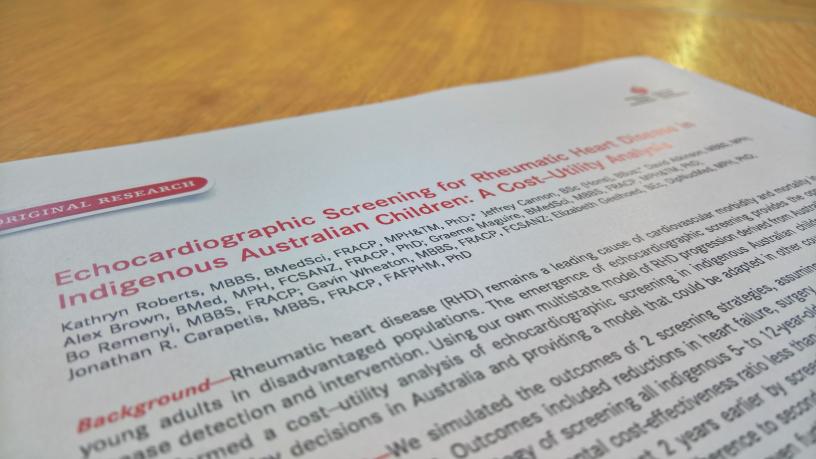Cost-effectiveness and Clinical Impact of Echocardiography Profiled in JAHA

In this month’s issue of the Journal of the American Heart Association, paired papers by Cannon and colleagues focus on the clinical progression of RHD and the potential economic impact of earlier diagnosis by echocardiographic screening.
The first article describes a multi-state model (MSM) of RHD progression in a young, contemporary Australian cohort. The MSM framework permits a more useful and valid analysis of RHD progression than a simple survival analysis, which can only evaluate one event (e.g. time to surgery, or time to death), and does not take into consideration competing risks where one event precludes the event of interest occurring (e.g. death preventing surgery). The model uses data on 591 Indigenous patients diagnosed with RHD between the ages of 5 and 24 years in the time period 1999-2012, and shows that of 96 (16.2%) patients with severe RHD at diagnosis, 50% proceeded to valve surgery by two years, and 10% were deceased within 6 years. The results clearly demonstrate that the prognosis of young people with severe RHD at diagnosis is bleak, even in a wealthy country such as Australia. The authors conclude that interventions must focus on earlier detection and treatment if the observed natural history is to be improved.
The Multi-State Model is also used in the second article to evaluate the cost-utility of echocardiographic screening for the earlier detection of RHD. This evaluation demonstrates the conditions in which echocardiographic screening is cost-effective in rural and remote areas of Australia, and methodically explores the impact of all modelled assumptions, allowing policy makers to make an informed decision when considering a screening programme in their setting. The authors acknowledge that economic analyses or cost-effectiveness is not the sole consideration for determining whether to implement a new health strategy. Important social and ethical reasons to tackle RHD also exist, as in the Australian context RHD predominantly affects the indigenous population. Given the increasing use of echocardiographic screening for RHD in many countries despite the limited evidence to support its routine use, this research offers a cornerstone in developing policy approaches to echo screening for RHD in all countries.
The issue also features an editorial by Kirkpatrick and Otto which highlights the importance of these two studies in providing important data to support echocardiographic screening.
The articles are both Open Access and available on the Journal of the American Heart Association website as follows:
Echocardiographic Screening for Rheumatic Heart Disease in Indigenous Australian Children: A Cost–Utility Analysis
Rheumatic Heart Disease Severity, Progression and Outcomes: A Multi‐State Model





